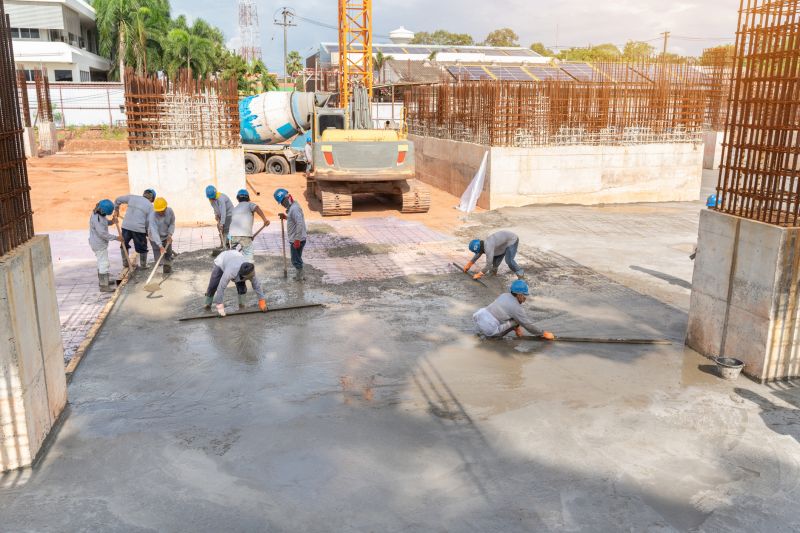Ultimate Product Guide for Concrete Installation Professionals
Get insights into the most popular and effective products to elevate your concrete construction projects.
 Concrete installations are a fundamental aspect of construction and renovation projects in San Luis Obispo, CA. Whether you're pouring a new driveway, creating a patio, or installing a foundation, selecting the right products ensures durability and a professional finish. From mixing and pouring to finishing and sealing, each stage requires specific tools and materials to achieve optimal results. Proper preparation and the right products can make a significant difference in the longevity and appearance of concrete structures.
Concrete installations are a fundamental aspect of construction and renovation projects in San Luis Obispo, CA. Whether you're pouring a new driveway, creating a patio, or installing a foundation, selecting the right products ensures durability and a professional finish. From mixing and pouring to finishing and sealing, each stage requires specific tools and materials to achieve optimal results. Proper preparation and the right products can make a significant difference in the longevity and appearance of concrete structures.
Top Overall Option
Concrete Mixing and Finishing Kit
A comprehensive concrete mixing and finishing kit provides a versatile set of tools suitable for various installation projects. It typically includes a durable mixing tub, trowels, floats, and finishing tools, designed to facilitate a smooth and consistent application. This all-in-one solution helps streamline the process from mixing to finishing, making it a practical choice for both DIY enthusiasts and professional contractors.
Types of Products For Concrete Installations
Concrete Mixers
Devices used to combine cement, aggregate, and water to produce uniform concrete for various applications.
Formwork and Molds
Structures that shape and support poured concrete until it hardens, available in various sizes and materials.
Reinforcement Materials
Steel rebar, mesh, and fibers used to strengthen concrete structures and improve durability.
Concrete Vibrators
Tools that eliminate air pockets and ensure proper compaction of concrete during pouring.
Finishing Tools
Trowels, floats, and edgers used to achieve a smooth and level surface on poured concrete.
Sealants and Curing Compounds
Products applied to concrete surfaces to retain moisture and protect against cracking and wear.
Expansion Joints
Materials that allow for movement in concrete structures, preventing cracking due to temperature changes.
Concrete Pumps
Machines designed to transfer liquid concrete to specific locations, especially useful for large projects.
Surface Densifiers
Chemical solutions that harden the surface of concrete, enhancing durability and appearance.
Edge Forms and Borders
Accessories that define the edges of concrete slabs for a clean, finished look.
Concrete Cutters and Saws
Tools used to cut and score concrete for expansion joints or modifications.
Curing Blankets and Covers
Materials that retain moisture during the curing process, ensuring proper hardening.
Vapor Barriers
Sheets placed beneath concrete slabs to prevent moisture migration from the ground.
Anchors and Fasteners
Hardware used to secure fixtures and structures to concrete surfaces.
Concrete Repair Products
Patch compounds and fillers designed for fixing cracks and damages in existing concrete.
Popular Choices
Compact and easy-to-use mixers suitable for small to medium projects, offering mobility and convenience.
Hand tools essential for smoothing and finishing concrete surfaces, available in various sizes.
Tools that facilitate shaping and sizing reinforcement bars efficiently on site.
Vibration tools used to compact concrete in small areas or tight spaces.
Products that help protect concrete surfaces from water intrusion and damage.
Preformed materials that accommodate movement in concrete slabs, preventing cracks.
Power tools designed for precise cutting of hardened concrete during modifications.
Spray-on solutions that provide moisture retention during curing to improve surface quality.
Steel mesh sheets used to reinforce slabs and prevent cracking over time.
Equipment used to smooth and level concrete surfaces after curing.
Fasteners used to attach fixtures securely to concrete surfaces.
Chemicals applied to molds to facilitate easy removal and prevent sticking.
In the realm of concrete installation, quality tools and accessories help facilitate smooth workflows and consistent outcomes. For instance, high-quality concrete mixers ensure uniform mixing, while formwork and molds define the shape and size of the poured concrete. Finishing tools like trowels and floats help create a smooth surface, and sealants protect the finished surface from moisture and wear. Understanding the various product options available can help homeowners and contractors make informed decisions tailored to their specific project needs.
Safety and efficiency are also critical considerations in concrete work. Protective gear such as gloves and eye protection, along with proper ventilation during mixing, contribute to a safer work environment. Additionally, accessories like expansion joints and reinforcement materials improve the structural integrity of concrete installations. Whether you are undertaking a small DIY project or managing a large-scale construction, choosing the appropriate products ensures the work is completed effectively and safely.
Key Buying Considerations
- Project scale and scope to determine the quantity and type of products needed.
- Compatibility of reinforcement materials with concrete mix and structural requirements.
- Ease of use and safety features of tools and accessories.
- Durability and resistance to environmental factors in your location.
- Compatibility of sealants and curing compounds with concrete surfaces.
- Availability of replacement parts and customer support for tools.
- Budget constraints balanced with quality and longevity of products.
- Specific project requirements such as load-bearing capacity or aesthetic finish.
- Ease of transportation and storage of equipment and materials.
- Environmental conditions during installation, including temperature and humidity.
- Type of concrete mix being used and its specific requirements.
- Compatibility of formwork materials with the project design.
- Time constraints and efficiency of the products for completing the project.
- Local regulations or building codes that may influence product choices.
- Availability of professional assistance or guidance for complex installations.
